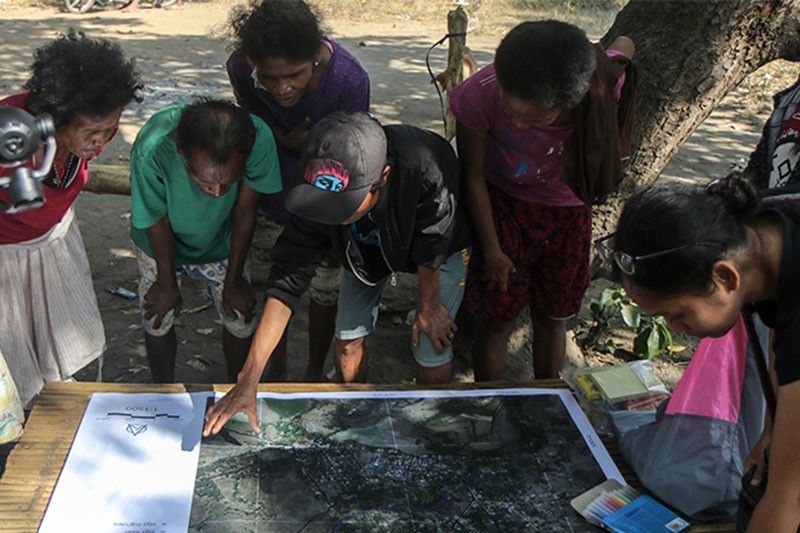BCDA on Aeta eviction notice: No forcible demolition in New Clark City

MANILA, Philippines — After reports of a seven-day eviction notice to an Aeta community in Tarlac circulated on social media, the Bases Conversion and Development Authority on Thursday released a statement denying any “forcible demolition” in New Clark City.
“The seven-day notice issued by the [BCDA] is a standard follow-up letter sent to all claimants who rejected the financial assistance offered by government,” the Thursday statement on the BCDA website read.
“There are no targeted Aeta communities. The notice was given to all claimants to inform of the need to start the construction of the New Clark City to Clark International Airport access road in that particular area.”
Eviction notice
Sandugo, a Moro and indigenous people's alliance, on Wednesday posted a photograph of the said eviction notice.
“Nais po naming ipabatid sa inyo na ang lupain na kasalukuyang kinatitirikan ng inyong bahay/istruktura o sinasaka niyo sa Barangay Aranguren, Capas, Tarlac ay pagmamay-ari ng pamahalaan na nasa ilalim ng pangagasiwa ng [BCDA] ayon sa Batas Republika Bilang 7227," the document read.
(We wish to inform you that the land where your housing is based and which you till in Barangay Aranguren, Capas, Tarlac is owned by the government and is administered by the BCDA based on RA 7227, or the Bases Conversion and Development Act of 1992.)
"Dahil po dito at bilang makataong pakikitungo, kayo po ay binibigyan ng pitong (7) araw na paglugit, simula sa araw ng pagkatanggap ng liham na ito, upang makipag-ugnayan sa aming opisina at isumete sa BCDA ang mga nararapat na dokumento at gayundin ay boluntaryo o kusang-loob na lisanin ang nasabing lugar at baklasin ang anumang istruktura na itinayo ninyo dito, kung meron man, upang magbigay daan sa gagawin at agarang pagpapatupad ng nasabing proyekto ng gobyerno."
(Due to the government’s New Clark City project and in order to extend goodwill, we are allotting you a seven-day period, upon the day of receipt of this letter, to coordinate with our office and submit to the BCDA any required documents and voluntarily leave the said area and remove any structures built, if any, to yield to the urgent implementation of the said project of the government.)
Casamira Maniego, head of the Asosyason ng Katutubong Mahawang in Capas, told Philstar.com that around 500 Aeta families would be displaced with nowhere to go.
Maniego, who received the notice from the BCDA on Monday, said the community rejects the eviction and is unsure if it will be effective as of December 9, exactly a week after receipt of the letter, or December 11, which excludes the weekend.
BCDA response
The BCDA said it followed due process by consulting and seeking the clearance of the Capas local government. It also said that since New Clark City is located within the Clark Special Economic Zone, it is a government land and owned by the BCDA under the law.
“There are NO declared ANCESTRAL DOMAINS or Certificates of Ancestral Domain Titles (CADT) in the area. Therefore, Aeta communities are not displaced,” the statement read.
“A financial assistance package amounting to Php300,000 per hectare (or Php30.00/sqm) has been made available by BCDA to all project-affected people, including indigenous peoples (IPs) and farmers even at the start of the development. Relocation sites have also been provided by BCDA WITHIN New Clark City for those whose residential structures were affected.”
The BCDA also said 500 Aetas were employed in the New Clark City project, which it claimed benefitted even those affected by the said development.
“New Clark City continues to provide opportunities for everyone especially for the IPs/farmers who may be affected in the development of roads and other infrastructure,” the statement read.
However, Maniego said she has communicated with Capas Mayor Reynaldo Catacutan, who said the community rejects any offer of relocation or payment in exchange for vacating their ancestral land.
Maniego said the Aeta community has resided in the ancestral domain for hundreds of years, even before the Spanish colonization of the country.
- Latest
- Trending

































